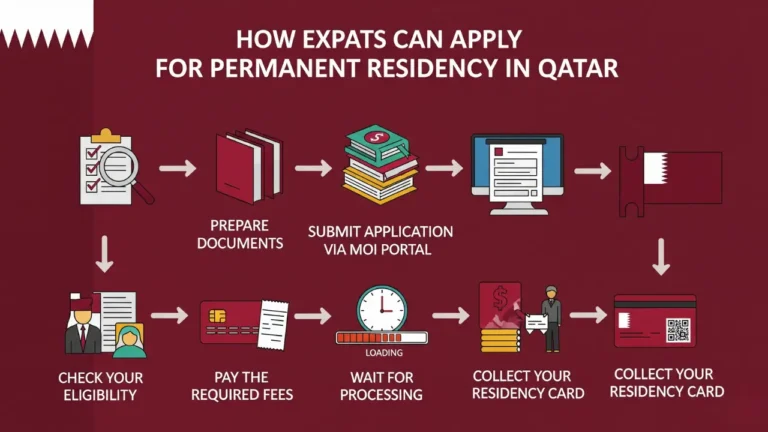Permanent Residency in Qatar for Expats – 2026 Full Guide
For expatriates already living and working in Qatar, securing a long-term future is an important step. Many expats ask if there’s a way to stay in Qatar without relying on employer sponsorship. That’s where permanent residency in Qatar for expats comes in as a legal solution that provides stability, family benefits, and investment opportunities.
Before considering permanent residency, it’s essential to make sure your Qatar ID (QID) is valid. You can check your Qatar ID status through this guide to avoid issues before applying. An active QID is a basic requirement for permanent residency.
What Is Permanent Residency in Qatar for Expats?
Permanent residency in Qatar for expats means long-term legal status for non-Qatari residents who meet specific criteria. It allows expats to live, work, invest, and sponsor family members independently of a Qatari employer.
Unlike Qatar’s investor residency, this pathway focuses on expats who have already contributed to the country over many years. Learn complete about Qatar permanent residency 2025.
Why Expats in Qatar Consider Permanent Residency
Many expats living in Qatar prefer permanent residency over regular work-based permits because it offers:
- Stability without the need for an employer sponsor
- The right to own property in approved areas
- Access to government healthcare and education services
- Business and investment opportunities
- Sponsorship rights for family members
If you want to learn more about expat-related rights linked to your QID, see this helpful guide about important Qatar ID benefits.
Who Can Apply for Permanent Residency in Qatar as an Expat?
Eligibility for permanent residency in Qatar for expats is selective. Applicants must meet the following requirements:
- At least 20 years of continuous legal residence in Qatar
- A clean criminal record confirmed by MOI
- Stable monthly income that meets government criteria
- Valid and active Qatar ID
- Good conduct certificate from the expat’s home country
You can review the full eligibility breakdown, including salary limits and family-related exceptions, in this Qatar permanent residency eligibility guide.
Required Documents for Expats Seeking Permanent Residency
To apply for permanent residency as an expat in Qatar, you will need:
- Valid Qatar ID
- Passport copy
- Salary certificate or financial proof
- Good conduct certificate
- Proof of residence duration in Qatar
- Health insurance documents
Expats who had their QID cancelled in the past must first reactivate their cancelled Qatar ID before applying.
How Expats Can Apply for Permanent Residency in Qatar
Follow these steps to apply for permanent residency in Qatar for expats in 2026:
- Check Your Eligibility: Confirm your years of residence, income level, and QID status.
- Prepare Documents: Collect all necessary papers, including QID, passport, and salary records.
- Submit Application via MOI Portal: Log in with your smart card or visit an MOI service center.
- Pay the Required Fees: Fees depend on family members included in the application.
- Wait for Processing: It usually takes 4–8 weeks for the Ministry of Interior to review your case.
- Collect Your Permanent Residency Card: Once approved, your card will be issued.

To navigate the MOI portal easily, learn more about MOI Qatar’s online services.
Main Benefits of Permanent Residency in Qatar for Expats
Expats granted permanent residency in Qatar receive:
- Sponsor-free residency status
- Real estate ownership rights in designated zones
- Healthcare and education for family members
- The ability to invest in businesses independently
- Long-term travel flexibility
How Is Expat Permanent Residency Different from Investment Residency?
While both options allow long-term residence, expat permanent residency is based on:
- Years lived in Qatar
- Work contributions
- Salary level and clean records
Investor residency focuses strictly on bringing capital into Qatar. If you want to explore investment-based pathways, check this Qatar permanent residency by investment guide.
Common Mistakes Expats Should Avoid
When applying for permanent residency in Qatar as an expat:
- Do not apply with an expired QID
- Make sure all documents are valid and complete
- Do not assume family members are automatically included — each must be listed in the application
- Double-check salary requirements before submitting forms
FAQs
Final Thoughts
For expats who have lived in Qatar for many years, permanent residency in Qatar for expats provides a reliable pathway to long-term security. It allows residents to invest, own property, sponsor family members, and enjoy benefits similar to Qatari citizens — without needing to rely on employer sponsorship.
If you meet the criteria, now is the right time to apply under the updated 2026 rules. Make sure your Qatar ID is active, your documents are ready, and apply through the Ministry of Interior’s official platform.

